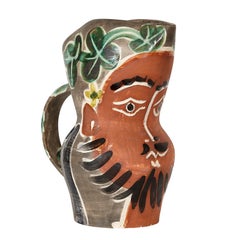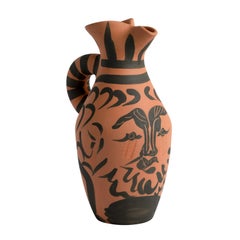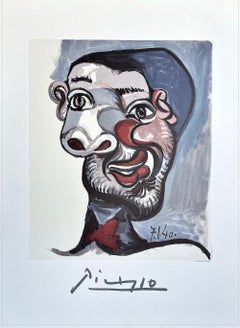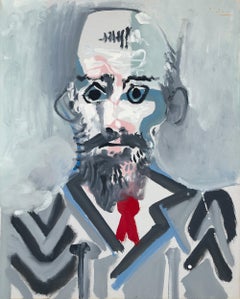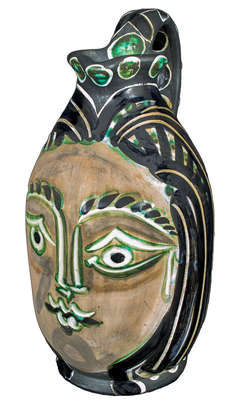Bearded Man Picasso For Sale on 1stDibs
On 1stDibs, you can find the most appropriate bearded man picasso for your needs in our varied inventory. There are many
contemporary,
modern and
Post-Impressionist versions of these works for sale. If you’re looking for a bearded man picasso from a specific time period, our collection is diverse and broad-ranging, and you’ll find at least one that dates back to the 20th Century while another version may have been produced as recently as the 21st Century. Adding a bearded man picasso to a room that is mostly decorated in warm neutral tones can yield a welcome change — find a piece on 1stDibs that incorporates elements of
gray,
beige,
black,
red and more. Finding an appealing bearded man picasso — no matter the origin — is easy, but
Corneille,
Pablo Picasso and
Pinchas Shaar each produced popular versions that are worth a look. Frequently made by artists working in
screen print,
engraving and
paint, these artworks are unique and have attracted attention over the years.
How Much is a Bearded Man Picasso?
The price for a bearded man picasso in our collection starts at $325 and tops out at $70,437 with the average selling for $1,571.
Corneille for sale on 1stDibs
The Dutch artist Corneille created lyrical, expressionist paintings bursting with color and was one of the founders of the postwar European art movement known as Cobra.
Corneille was best known for radicalizing the conservative Dutch art world in the early 1950s, making modern art not only acceptable, but embraceable as well. He placed familiar subjects — birds, cats, women and landscapes — in mythological and often childlike contexts, imbuing them with spontaneity and bright, sensual reds.
"I am a painter of joy," Corneille remarked at a 2007 exhibition of his work at the Cobra Museum, said Katja Weitering, the artistic director of the museum, in Amstelveen, near Amsterdam.
"He was really an artist for all people," she said. "He was open to the audience; he appeared in documentaries, on television, and frequently visited exhibitions. It's safe to say we consider him one of the most important modern artists of the postwar." In the Netherlands, she added, his fame and influence derived from the appeal of Cobra.
Born Guillaume Cornelis van Beverloo to Dutch parents on July 3, 1922, in Liège, Belgium, Corneille was influenced by Miró, Picasso and Paul Klee but claimed the most profound connection to van Gogh because of their shared passion for color, form and nature.
Corneille founded Cobra in 1948 with five other artists, including his close friends Karel Appel and Constant Nieuwenhuys. The name was an acronym made up of the artists' home cities — Copenhagen, Brussels and Amsterdam. The artists drew inspiration from surrealism, but believed that style promoted too much discussion and not enough action.
Instead, Corneille and his friends formed a united front in postwar Europe, urging a break from tradition and toward freedom and vitality. In an intense three years, Cobra produced two major international exhibitions and published 10 issues of a magazine for which Corneille wrote poetry. Cobra disbanded in 1951, saying it had achieved its goals, and the artists returned to their individual careers.
Corneille began his artistic life in 1940, studying at the Academy of Fine Arts in Amsterdam. Though he made his home base in Paris in the early 1950s, he traveled extensively in Africa, Cuba, Brazil, and Mexico. In Africa he became fascinated by the colors, smells and cultures, Ms. Weitering said, collecting brightly painted objects like the masks he later used as themes. He also spent time in Italy, Israel and San Francisco, expanding his repertory to include etching, ceramics and printmaking.
Beyond the Netherlands, Corneille's work is in the collections of several American museums, including the Fine Arts Museums of San Francisco and the Museum of Fine Arts in Boston.
A Close Look at Contemporary Art
Used to refer to a time rather than an aesthetic, Contemporary art generally describes pieces created after 1970 or being made by living artists anywhere in the world. This immediacy means it encompasses art responding to the present moment through diverse subjects, media and themes. Contemporary painting, sculpture, photography, performance, digital art, video and more frequently includes work that is attempting to reshape current ideas about what art can be, from Felix Gonzalez-Torres’s use of candy to memorialize a lover he lost to AIDS-related complications to Jenny Holzer’s ongoing “Truisms,” a Conceptual series that sees provocative messages printed on billboards, T-shirts, benches and other public places that exist outside of formal exhibitions and the conventional “white cube” of galleries.
Contemporary art has been pushing the boundaries of creative expression for years. Its disruption of the traditional concepts of art are often aiming to engage viewers in complex questions about identity, society and culture. In the latter part of the 20th century, contemporary movements included Land art, in which artists like Robert Smithson and Michael Heizer create large-scale, site-specific sculptures, installations and other works in soil and bodies of water; Sound art, with artists such as Christian Marclay and Susan Philipsz centering art on sonic experiences; and New Media art, in which mass media and digital culture inform the work of artists such as Nam June Paik and Rafaël Rozendaal.
The first decades of the 21st century have seen the growth of Contemporary African art, the revival of figurative painting, the emergence of street art and the rise of NFTs, unique digital artworks that are powered by blockchain technology.
Major Contemporary artists practicing now include Ai Weiwei, Cecily Brown, David Hockney, Yayoi Kusama, Jeff Koons, Takashi Murakami and Kara Walker.
Find a collection of Contemporary prints, photography, paintings, sculptures and other art on 1stDibs.
